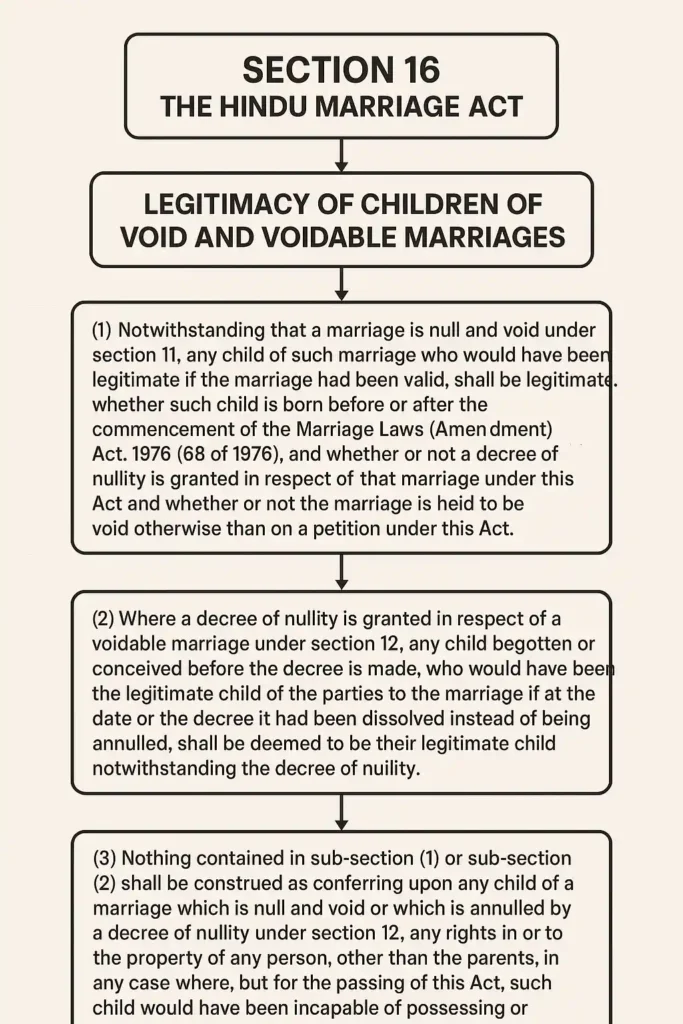Section 16 of The Hindu Marriage Act (HMA)
16. Legitimacy of children of void and voidable marriages.— (1) Notwithstanding that a marriage is null and void under section 11, any child of such marriage who would have been legitimate if the marriage had been valid, shall be legitimate, whether such child is born before or after the commencement of the Marriage Laws (Amendment) Act, 1976 (68 of 1976), and whether or not a decree of nullity is granted in respect of that marriage under this Act and whether or not the marriage is held to be void otherwise than on a petition under this Act.
(2) Where a decree of nullity is granted in respect of a voidable marriage under section 12, any child begotten or conceived before the decree is made, who would have been the legitimate child of the parties to the marriage if at the date of the decree it had been dissolved instead of being annulled, shall be deemed to be their legitimate child notwithstanding the decree of nullity.
(3) Nothing contained in sub-section (1) or sub-section (2) shall be construed as conferring upon any child of a marriage which is null and void or which is annulled by a decree of nullity under section 12, any rights in or to the property of any person, other than the parents, in any case where, but for the passing of this Act, such child would have been incapable of possessing or acquiring any such rights by reason of his not being the legitimate child of his parents.

Multiple Choice Questions for the AIBE Exams
1. What is the legal status of a child born from a void marriage under Section 16(1) of the Hindu Marriage Act, 1955?
A. Illegitimate
B. Legitimate
C. Adopted
D. Dependent
✅ Answer: B. Legitimate
🧾 Explanation: Section 16(1) clearly states that a child born from a void marriage shall be considered legitimate, as if the marriage had been valid, regardless of whether a decree of nullity is granted.
2. Under Section 16(2), a child conceived before the decree of nullity in a voidable marriage is:
A. Illegitimate and cannot claim any rights
B. Legitimate as if the marriage had been dissolved
C. Considered adopted by the mother only
D. Considered a ward of the court
✅ Answer: B. Legitimate as if the marriage had been dissolved
🧾 Explanation: Section 16(2) treats such a child as legitimate, as if the marriage had been dissolved (divorce) rather than annulled.
3. Which of the following is not conferred to a legitimate child under Section 16(3) of HMA?
A. Right to inherit father’s property
B. Right to inherit mother’s property
C. Right to inherit from grandparents
D. Legitimacy status
✅ Answer: C. Right to inherit from grandparents
🧾 Explanation: Section 16(3) restricts the property rights of such children to only their parents. They cannot claim rights over others’ property, such as ancestral property.
4. The legitimacy conferred under Section 16 applies to children born:
A. Only after the 1976 Amendment
B. Only if the marriage is declared void by the court
C. Before or after the 1976 Amendment, regardless of decree
D. Only if both parties consent to legitimacy
✅ Answer: C. Before or after the 1976 Amendment, regardless of decree
🧾 Explanation: Section 16(1) explicitly includes children born before or after the commencement of the Marriage Laws (Amendment) Act, 1976, with or without a decree.
5. Can a legitimate child under Section 16 claim coparcenary rights in the joint Hindu family property?
A. Yes, as a matter of right
B. No, unless permitted by the court
C. No, Section 16(3) bars it
D. Yes, if the marriage was voidable only
✅ Answer: C. No, Section 16(3) bars it
🧾 Explanation: Section 16(3) restricts such children from claiming rights in any property of persons other than their parents.
6. Which section declares that the legitimacy of a child does not depend on whether a decree of nullity is passed?
A. Section 11
B. Section 12
C. Section 16(1)
D. Section 16(3)
✅ Answer: C. Section 16(1)
🧾 Explanation: Section 16(1) states that a child of a void marriage is legitimate even if a decree of nullity is not granted.
7. A voidable marriage annulled under Section 12 results in:
A. All children born being illegitimate
B. Property rights being given to children automatically
C. Children conceived before decree being deemed legitimate
D. No legal effect on children
✅ Answer: C. Children conceived before decree being deemed legitimate
🧾 Explanation: Section 16(2) deems children conceived or begotten before the decree as legitimate.
8. What is the main intent behind Section 16 of the HMA, 1955?
A. To punish those who enter void marriages
B. To protect the legitimacy of innocent children
C. To increase adoption of such children
D. To dissolve voidable marriages automatically
✅ Answer: B. To protect the legitimacy of innocent children
🧾 Explanation: The purpose is to remove the stigma of illegitimacy from children of void and voidable marriages.
9. Which of the following statements is true regarding Section 16 of HMA?
A. Children from void marriages can inherit ancestral property
B. Legitimacy granted under Section 16 allows full succession rights
C. Legitimacy under Section 16 is limited to rights against parents
D. The section applies only to Hindu men
✅ Answer: C. Legitimacy under Section 16 is limited to rights against parents
🧾 Explanation: Section 16(3) makes it clear that such legitimacy does not extend to property rights from other relatives or ancestors.
10. Which case upheld the validity of Section 16 and protected the rights of children born from void marriages?
A. Githa Hariharan v. RBI
B. Revanasiddappa v. Mallikarjun
C. Joseph Shine v. Union of India
D. Shafin Jahan v. Asokan
✅ Answer: B. Revanasiddappa v. Mallikarjun
🧾 Explanation: In Revanasiddappa v. Mallikarjun (2011), the Supreme Court gave a broader interpretation to Section 16, recognising the legitimacy and some inheritance rights of such children.
